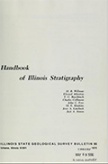Historical:Hoing Sandstone Member
Lithostratigraphy: Hunton Limestone Megagroup >>Cedar Valley Limestone >>Hoing Sandstone Member
Chronostratigraphy: Paleozoic Erathem >>Devonian System >>Middle Devonian Series
Allostratigraphy: Kaskaskia Sequence
Authors
Charles Collinson and Elwood Atherton
Name Origin
The Hoing Sandstone Member of the Cedar Valley Limestone (Hinds, 1914, p. 12), the basal member, was originally called the "Hoing oil sand" for its occurrence in a well on the Hoing Farm, near Colmar, McDonough County, the discovery well of the Colmar-Plymouth oil field (Blatchley, 1914).
Other Names
It was called the Hoing sand, or the "Hoing" sandstone, until formally designated the Hoing Sandstone (Howard, 1961).
Extent and Thickness
The Hoing is patchy in western Illinois. Although it is commonly only a few inches thick, it reaches 30 feet thick in the Colmar-Plymouth oil field.
Description
Where well developed the Hoing Member is a clean, friable sandstone composed of well rounded, fine to medium quartz grains. However, where it directly overlies the Silurian dolomite it commonly contains residual debris from erosion of the dolomite. At the exposure at the Monterey School, Calhoun County (NE SW 11, 12S-2W), the Hoing Member is 0-2 feet thick and consists of sandstone, shale, and chert conglomerate overlying the deeply eroded Silurian dolomite (Collinson et al., 1954). Thin lenses of sand also occur locally higher in the Cedar Valley Limestone.
References
BLATCHLEY, R. S., 1914, Plymouth oil field: Illinois State Geological Survey Extract from Bulletin 23, p. 5-7.
COLLINSON, CHARLES, D. H. SWANN, and H. B. WILLMAN, 1954, Guide to the structure and Paleozoic stratigraphy along the Lincoln Fold in western Illinois: Illinois State Geological Survey Guidebook Series 3, 75 p.
HINDS, HENRY, 1914, Oil and gas in the Colchester-Macomb Quadrangles: Illinois State Geological Survey Extract Bulletin 23, p. 8-13.
HOWARD, R. H., 1961, Oil and gas in the Adams-Brown-Schuyler County area, Illinois: Illinois State Geological Survey Circular 325, 23 p.
ISGS Codes
| Stratigraphic Code | Geo Unit Designation |
|---|---|
